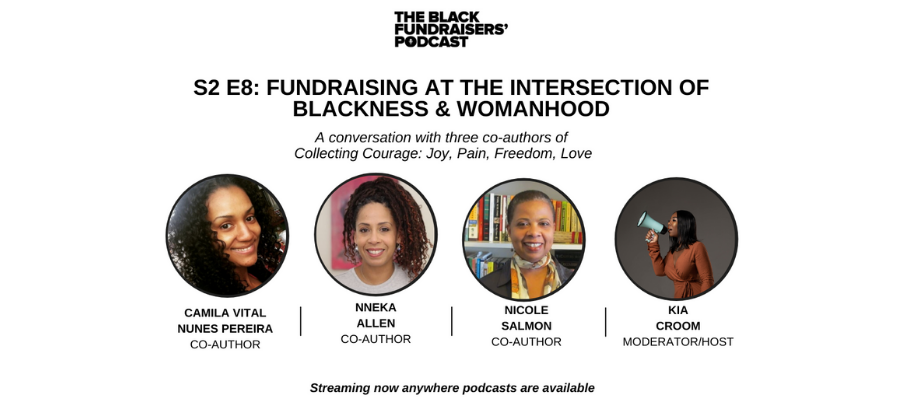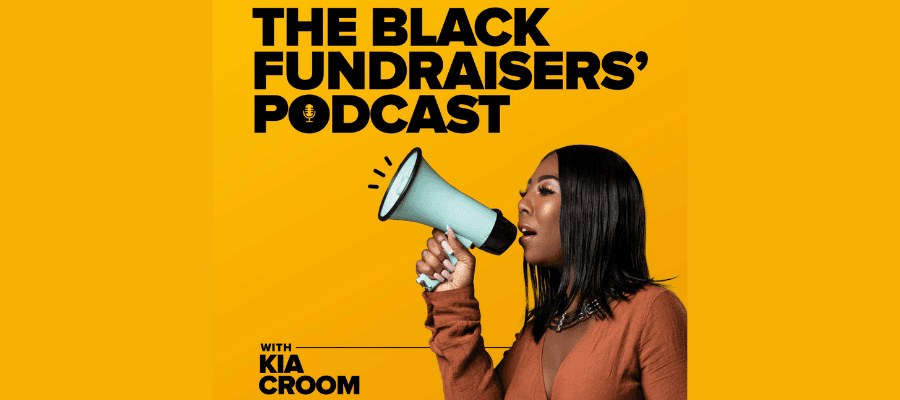Fundraising at the intersection of Blackness and Womanhood
‘Racial trauma is real’ states Kia Croom at the outset of this powerful article, as she reflects on a podcast she recorded with three Black women fundraisers. Discrimination, structural barriers and constant micro and macroaggressions are still commonplace in fundraising – it’s time for things to change.
- Written by
- Kia Croom
- Added
- October 21, 2021

Racial trauma is real. Over the last 18 months we’ve seen Black employees of corporations, institutions of higher learning and non-profits alike share their personal accounts with workplace racial discrimination and racial abuse.
Last weekend, in the United States of America, we witnessed Black NFL players fighting back tears in reaction to racist remarks made by the Raiders former head coach Jon Gruden surfaced. We were stunned to learn that a San Francisco federal court ordered Tesla to pay a former Black, male employee US$137 million in damages due to the racial abuse he suffered while working for the company.
I invited three co-editors of Collecting Courage: Joy, Pain, Freedom Love – Nneka Allen, Nicole Salmon and Dr Camila Vital Nunes Pereira – to join me on the Black Fundraisers’ Podcast to discuss their lived experiences with anti-Black racism as detailed in the book.
They described in visceral terms the racial trauma they contend with working as Black, female fundraisers in Canada’s non-profit sector.
I quickly learned that although we live and/or work in different regions of North America, we’ve shared painfully similar encounters with anti-Black racism and white supremacy in our respective workplaces.
In a spirited conversation, we discussed the unique challenges we face as Black female fundraisers including structural barriers to key networks and funding resources. Research from the Association of Black Foundation Executives (ABFE) and The Bridgespan Group illustrates the philanthropy sector’s predilection for generously funding white-led non-profit agencies and discriminately giving to Black-led agencies. This practice poses implications for our performance, which is often evaluated by the amount of funding we raise, our access to human capital and major donors.
We shared our lived experience with macro and microaggressions in the workplace, which run the gamut from being ‘talked over’, or ‘cut-off’ when speaking in meetings to being excluded from key internal meetings and externally facing events.
‘The pain comes from things that happen, little things that you hear, meetings that you don’t participate in, emails that you don’t get, and it hurts you’, said Dr Camila Vital Nunes Pereira.
Nicole Salmon, founder of Boundless Philanthropy, shed light on the psychological consequences Black female fundraisers suffer from racial abuse:
‘People don’t respond to us when we say we are in pain, so we suffer with it. No matter how confident you are it strips away at your very being. All that confidence that you’ve built up over the years it tatters after being subjected to these kinds of harms through micro or macroaggressions’, she said.
In addition to the psychological consequences, we discussed how racial trauma somatises itself over time causing physical distress.
‘Racism affects our bodies first, we hold it in our bodies, so our bodies know and keep score’, said Nneka Allen, principal/founder of the Empathy Agency. ‘I think it’s important that as Black women we continually trust our bodies and what they say to us. Believe your body’, she added.
In addition to causing both physical and psychological damage, anti-Black racism and racial trauma thwarts promotional opportunities for Black women who aspire to ascend to a position of high leadership.
‘We want to expand our knowledge and rise among the ranks, but we don't have those advocates, those sponsorship relationships because people are not advocating for you and carving the space for you to move forward in your career’, Salmon said.
Amid tears, laughter, and words of affirmation we concluded that we share a deep love for the sector, a deep love for community and intrinsic motivation to make a difference in society through our work. However, we agreed that aligning ourselves to causes that value and celebrate Blackness and inclusion will be key along our respective journeys.
You can listen to the full podcast, season two, episode eight, ‘Fundraising at the Intersection of Blackness & Womanhood’ here.
About the Black Fundraisers’ Podcast
The Black Fundraisers' Podcast was founded in 2021 by Kia Croom, a 20-year non-profit fund development & fundraising professional and DEI champion to celebrate, inspire and equip Black fundraisers to make a positive impact in Black communities. The platform provides a safe space to explore the unique challenges Black development and advancement officers contend with in their work.
About Collecting Courage: Joy, Pain, Freedom, Love
Collecting Courage is a powerful and moving collection of personal experiences written by Black fundraisers that chip away at the idea of an inherent goodness of the charitable sector. So how can a sector that exudes such external benevolence be the cause and source of pain and trauma in the form of macro and micro aggressions as documented in these stories? It has to do with who holds power and influence; it has to do with white supremacy, inequity and racism and it has to do with deeply entrenched beliefs, behaviours and exclusionary policies and practices that have been ‘normalised’ within the sector.
These personal testimonies document racism, survival, and the pre-eminence of 14 accomplished Black North American Fundraisers, five from the United States and nine from Canada. This collection of works also speak to the journey of asserting Black identity in all-white work environments. The writers speak of their quest, often thwarted in the charitable sector, to bring to their workplaces the love they have inherited from their struggles to survive in a white dominated society. These brilliant, first-person narratives give voice to a more accurate and complete picture of philanthropy and charity in North America.
You can purchase your own copy of the book, here.


















